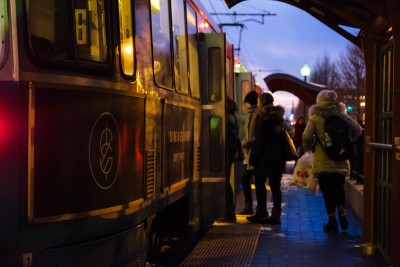
The Massachusetts Bay Transportation Authority announced that it would decrease its projected fiscal 2017 operating deficit by 43 percent, according to a Monday press release.
The release stated that the decision comes from an increase in revenue from real estate and advertising as well as reductions in overtime spending.
The MTBA plans to save money and invest into long-needed service renovations, such as a new third rail for the Red Line, heating improvements on the Orange Line and new track switches for the Green Line, according to the press release. Additionally, it plans to invest $26.5 million into Winter Resiliency Work as well as $3.5 million for track improvements along the Framingham/Worcester Commuter Rail Line.
Frank DePaola, general manager of the MBTA, said in the press release that any money the MBTA can get to invest into the operating system would improve service.
“Every dollar that we can free up in operating expense is invested back into the system, helping us improve the level of service reliability,” DePaola said in the release.
Charlie Ticotsky is the policy director at Transportation for Massachusetts, a coalition of organizations that work together “to create safe, convenient, and affordable transportation for everyone,” according to its website.
Ticotsky said a 10 percent increase in fares would not be ideal for the City of Boston.
“We feel strongly that fare increases should be modest and predictable, so no more than a 5 percent increase in two years,” Ticotsky said. “We feel going over 5 percent is punitive to riders, especially when the service of the MTBA isn’t getting any better, so we are strongly urging the board to approve of the hike for 5 percent or less.”
Ticotsky said that in terms of the MBTA cutting next year’s projected fiscal operating deficit, reducing spending and increasing cost savings would prove beneficial, but there will be enough money for spending regardless.
“We are very happy in the reduction and cost savings that they’ve found in the operating budget, and we think it takes away one of the arguments that they’ve been making, that fare hikes are necessary to plug the operating budget now that the deficit is much smaller,” Ticotsky said.
He added, “There’s almost no deficit anymore because they’re getting $117 million from the state government. So when they talk about the deficit, they don’t include that, so we think the savings are great but they already have more than enough money to balance the budget for next year.”
Several Boston residents were wary of the possibility of fare hikes, but also viewed the MTBA service upgrades as necessary.
Sarah Edwards, 25, of Brighton, said an increase in rider fares would be difficult for college students, a large population of MBTA users, to afford.
“I don’t like the idea of an increase in T fares, but if that’s the only way get the MTBA out of debt, then so be it,” she said. “But considering that college students take the T a lot, and they’re already financially tight as it is, it’s not really the best idea.”
Kelly Hanlon, 36, of Brighton, said MBTA service changes would make her commute easier.
“I think it’s about time the T had some renovation,” she said. “It seems as if I can’t go downtown without adding an extra 15 minutes into my schedule. There are always delays. Trains are always shutting down. If that means I have to pay an extra 5 percent, I think I will, but I won’t be happy about it.”
Michael Gill, 29, of Brighton, said he uses public transportation frequently and would welcome improvements to the system.
“I’m running around Boston constantly, and the T has been my lifeline,” he said. “There’s an obvious need for renovations when I’m running around with a camera and the train is delayed, and it’s a mess trying to get myself on a crowded train. It’s great that they’re making improvements, but they need work.”




